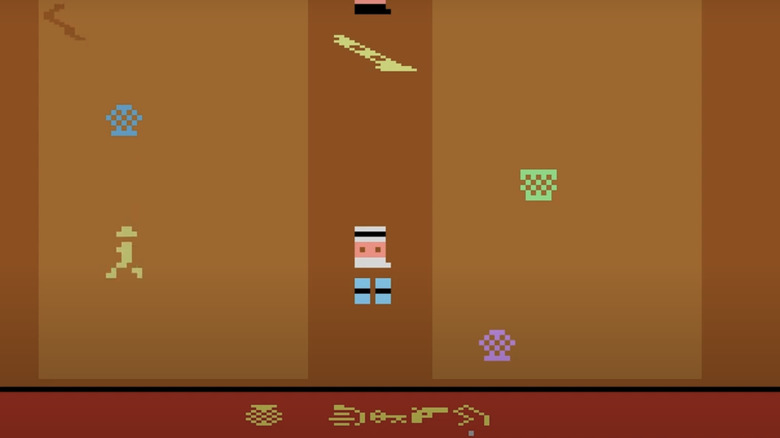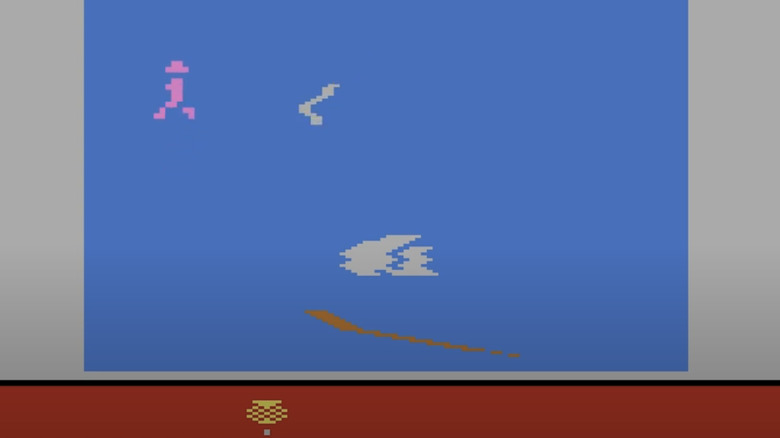A Steven Spielberg Hero Gave Us The First Ever Movie Video Game
We're about to see a heck of lot more video game movies. The superhero genre, which proved to be Hollywood's most powerful weapon in wrenching kids away from their iPads and YouTube for more than a decade, is waning. Meanwhile, the industry continues its struggle to adapt to the streaming age in a pandemic era where people are really only attending the multiplex for event films. But with "The Super Mario Bros. Movie" becoming one of the highest-grossing films ever and "A Minecraft Movie" also crushing it at the box office, it seems video games are the new superheroes (the biggest bomb of 2024, "Borderlands," notwithstanding).
"Five Nights at Freddy's," the "Sonic" movies, and even "Fallout" and "The Last of Us" on the TV side of things. This is the new era we find ourselves in, where video game IP becomes the new font for all Hollywood's ideas. But this is very much the reverse of how things have worked since video games became a thing. Prior to this burgeoning golden age of video game movie adaptations, studios and filmmakers would provide the IP, which game developers would then do their best to translate into a decent licensed product.
Such a system produced some truly great games but also resulted in some of the worst licensed products ever made. Case in point: the "E.T. The Extra-Terrestrial" game. One of the earliest licensed video game adaptations, this blunder based on Steven Spielberg's classic has lived in infamy ever since its 1982 debut. Naturally, Atari has had to bear the brunt of the blame for its failure. Meanwhile, Spielberg can at least rest easy knowing that he was not only responsible for kicking off the entire licensed video game movie adaptation system, but that the first game based on one of his films was actually quite good.
Raiders of the Lost Ark was the first official licensed movie game
By the early '80s, video games had already become big business, having flourished in the 1970s both in terms of arcade games and home consoles. In 1978, the "Space Invaders" arcade game kicked off a surge in popularity for the hobby, with games such as "Asteroids," "Missile Command," "Galaga," and "Pac-Man" all releasing in quick succession. Meanwhile, Atari and Magnavox saw success with their Atari Video Computer System (aka the Atari 2600) and the Magnavox Odyssey 2 respectively, both of which introduced cartridge gaming to homes worldwide — especially after Atari nabbed the license for a home version of "Space Invaders," which debuted in 1980.
Throughout this time, however, video game developers hadn't yet turned to movies for inspiration. Atari's "Superman" was released in 1979 as a result of Warner Communications, which owned Atari, seeing the success of Richard Donner's classic of the same name (a movie which gave us the modern blockbuster). However, this was not an officially licensed video game adaptation of the movie and was essentially a reworked version of the video game "Adventure," which would eventually debut in 1980. Prior to that, in 1976, developer Exidy had produced a "Death Race" video game that some outlets have reported was inspired by the 1975 movie "Death Race 2000." However, Exidy staff have reportedly denied that was the case, and either way, it was not an officially licensed game. It wasn't until Steven Spielberg delivered "Raiders of the Lost Ark" in 1981 that we got the first official video game adaptation of a movie.
Atari's "Raiders of the Lost Ark," holds the official Guinness World Record for being the first ever game based on an official movie license. It was released for the Atari 2600 in 1982, around the same time Fox unveiled an "Alien" game designed to tie into Ridley Scott's sci-fi horror masterpiece. But Spielberg and his action adventure classic beat them to the punch with a game that actually holds up pretty well.
Raiders of the Lost Ark was a solid game
Unlike the "Alien" game, which was essentially a "Pac-Man" reskin, "Raiders of the Lost Ark" for the Atari 2600 was developed from the ground up. Released in November 1982, more than a year after the film of the same name had debuted, "Raiders" was designed by Howard Scott Warshaw, the developer responsible for the infamous misstep that was the "E.T." game (which was released just a month after "Raiders"). But his Indiana Jones game was actually quite good and was, in fact, the reason Spielberg specifically requested Warshaw work on the "E.T." adaptation. Warshaw once told NPR about showing the director his final build of "Raiders," stating:
"He looks up at me and he says, 'It's just like a movie. I feel like I just watched a movie,' I thought, 'Oh my God! Steven Spielberg thinks my adventure game is just like a movie!' To me that was the ultimate compliment I could possibly receive on this work."
Much like the movie, the "Raiders" game involves Indy hunting down the Ark of the Covenant. Players control the intrepid archeologist using two different controllers, one to move the character and use items and one to select and drop items. Unlike the movie, however, the game is set entirely in the city of Cairo in 1936, where Indy finds his way into a temple before traversing one of two perilous paths and winding up in the treasure room. The rest of the game involves players embarking on an adventure across mesas, a Thieves Den, a Black Market, and ultimately digging up the Ark. All of this led to a decent critical response, with reviewers praising the problem-solving elements (even if the 8-bit Indy theme wasn't a perfect recreation of John Williams' original composition). For Warshaw, that surely paled in comparison to the seal of approval from Spielberg, even though the filmmaker was less kind when he played "E.T."
Now, almost half a century later, directors are the ones playing their movies for video game developers. Soon, we'll have a "Legend of Zelda" movie from director Wes Ball, more "Sonic" films, and another season of the stellar video game adaptation that is "Fallout." As boundary-pushing as they were back in the early '80s, I'm sure neither Spielberg nor Warshaw saw any of this coming.


